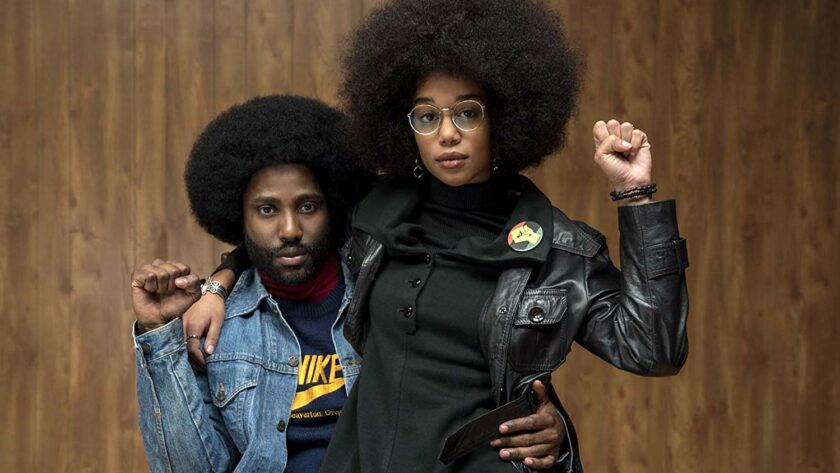Karina Tukanova reviews Spike Lee’s Cannes-winning, KKK-infiltrating biopic.
There are few films that can leave me speechless. Not because it is hard to impress me, but because there is always something left to be said, discussed, or think about. Yet I find it hard to put into words what BlacKkKlansman really is. It is funny, heart-breaking, infuriating – all at the same time, and definitely is worth the hype.
Spike Lee’s most recent hit, BlacKkKlansman, has already won over the hearts of critics and audiences alike. Set in the early 1970’s, the film chronicles “some fo’ real, fo’ real shit”. A story of the first African-American officer to serve in Colorado Springs Police Department, Ron Stallworth (John David Washington) is determined to make a name for himself after he joins the force and sets out on an undercover mission to infiltrate and expose the local chapter of the Ku Klux Klan (the KKK). His Jewish partner Flip (Adam Driver) becomes a surrogate to the mission, acting as a blacks-Jews-Mexican-Irish–hating persona of Stallworth at the Klan’s meetings. The two eventually gain insider knowledge about “the Organisation,” preventing several cross-burnings and deadly plots. But was this investigation a success, or were their efforts futile? BlacKkKlansman leaves you only with one answer.

Brought to life by the same team behind Get Out, one would expect the same level of witty humour blended with all-too-current issues of racial identity in the US from Lee’s work. Justly, BlacKkKlansman does not disappoint. It is somehow funny and brutally honest, hammering home its main message: history repeats itself. Indeed, the whole film seems to be structured around leveraging a 1970s tale to shine a light on – or should I say shove down your throat – what’s happening in our world right now. The parallels are so in-your-face, there is little left to interpret. At one point even, a white cop explains to Stallworth that the way to promote racist ideology among average Americans is to slip it beneath other issues such as immigration and crime. He then continues that Americans one day will elect someone who embodies these ideals. All the while throughout the film, we hear “America first” and cries for the country to “achieve its greatness again.”
Sounds a bit too familiar, doesn’t it? Some would say that this all-too-political approach weighs down the otherwise decently made fiction flavoured with a documentary, but isn’t this exactly what we need right now? As the white cop urges Stallworth, it is time for the world to “wake up”. BlacKkKlansman does not shy away from using history to offer a bitter commentary on current politics and this is exactly what makes it so uncomfortably important.

Politics aside, BlacKkKlansman deserves a share of its own for the grappling tension and drama. The dual oppositions – black power vs white power, deeply moving gatherings of BSU vs perverse rituals of the Klan, compassion vs hatred, past vs present – are the backbone of the narrative, and the suspense created leaves you itching at the edge of your seat.
One feature that does balance out the otherwise bleak undertones is the well-balanced humour. Outlandish at times, it offers a necessary relief without undermining the dramatic tension. “With the right white man,” Stallworth jokes, “we can do anything.” The audience bursts in genuine laughter, only to realise the bitter aftertaste of Ron’s words. The slapstick comedy scattered throughout is by no means absurd and on the contrary quite cunning. Except for some Klan members. The KKK are obviously terrible people, yet their portrayal is frankly pathetic, rendering them unrealistic. Save for the amazing performance of Jasper Pääkkönen as Felix Kendrickson and poignant portrayal of David Duke, grand wizard of KKK (Topher Grace), the Klansmen are caricatures of themselves. Outright dense and misogynistic, they are not only unlikeable but incomprehensible characters. They seem to be a thing of the past – so ridiculously pompous in their beliefs – and it’s hard to imagine any sane person say “blacks” with such passionate hate (they use a far less endearing term). Maybe though, this is exactly what Lee was aiming to show: these are no relics of the past but terrifying realities.

What did bring down the film was the odd pacing, especially in the beginning. Some scenes turned out to be needlessly long – I found myself looking at my watch couple of times. At the same time, some of the most dramatic and exciting moments seemed to be squeezed in a matter of minutes. Such is the case with the sub-plot of Stallworth’s romantic interest, the BSU president Patrice (Laura Harrier). Their love story only serves the main plot and disintegrates into nothing midway through the film. The epitome of their tension – Stallworth who believes he can change things from the inside and Patrice who is angry at the injustice Black people face at the hands of the police, or “pigs” – is brushed off towards the end. Even though completely fiction, the audience never gets a full exploration of their relationship and these conflicting opinions. Don’t get me wrong though, it is indeed a thrilling film to watch with only minor flaws that can be easily ignored. Especially great are the visuals. The iconic dolly shots, aesthetic colour palette, and stylised costumes make it impossible to resist getting sucked into the visceral environment of 70s America. Topped off with a wonderful soundtrack, it makes a very pleasant watch.
BlacKkKlansman’s most powerful and nerve-shattering part, however, ditches completely from the story of Ron Stallworth. The eruptive fictional violence that we see characters experience on screen suddenly turns into an all-too-real and disheartening clips of white supremacists’ march in Charlottesville, Virginia, along with the real David Duke and his avid support for Trump’s administration. Seconds later we see the man himself, proudly proclaiming that not all white supremacists are Nazis, and that “there is blame on both sides.” The last shot, like a punch in the stomach, is the familiar stars and stripes turned upside down, stripped of their lively colours. If BlacKkKlansman were to come out a year earlier, it would have been an unnerving prophecy. Now, rather, it is an alarming confrontation with the truth. Watching it with a lump in my throat, I could hear the penetrating silence that filled the audience and stuck with me since. BlacKkKlansman reinforces what we are already frustrated with and calls us out directly: do we really believe racism is a thing of the past or do we just choose to hide behind the pathetic lies?
BlacKkKlansman is currently out in UK cinemas everywhere. Check out its trailer below:




